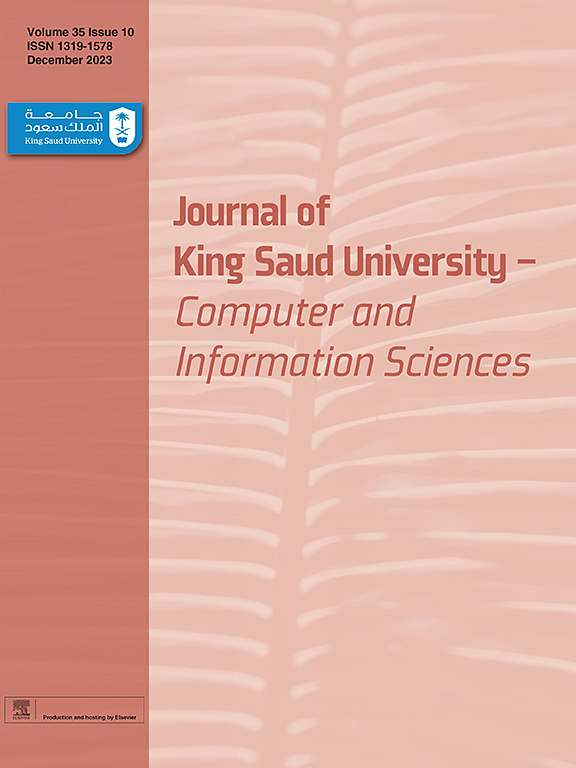基于关系图卷积神经网络的推荐图对比学习
IF 5.2
2区 计算机科学
Q1 COMPUTER SCIENCE, INFORMATION SYSTEMS
Journal of King Saud University-Computer and Information Sciences
Pub Date : 2024-09-14
DOI:10.1016/j.jksuci.2024.102168
引用次数: 0
摘要
当前基于知识图谱的推荐方法严重依赖高质量的知识图谱,但往往无法有效解决冷启动问题和用户交互中的异构噪声等问题。这会导致用户兴趣和受欢迎程度出现偏差。为了克服这些挑战,本文介绍了一种新颖的推荐方法,即利用关系图卷积神经网络的知识增强型感知图注意与图对比学习(KPA-GCL)。所提出的方法基于异构图中相邻实体之间的关系,优化了实体-项目交互的三重嵌入表示。随后,采用图卷积神经网络进行增强聚合。来自对比视图的相似性得分可作为高质量嵌入表示的选择标准,从而促进对精细知识子图的提取。通过结合贝叶斯个性化排名(BPR)和硬负采样技术,引入了多种自适应对比度损失优化函数。利用真实的公共数据集,与现有的十种流行方法进行了对比实验。结果表明,基于 Recall、NDCG、Precision 和 Hit-ratio 等指标,KPA-GCL 方法在所有数据集上都优于其他方法。此外,在减少冷启动和噪音方面,KPA-GCL 方法超过了其他十种方法。这验证了 KPA-GCL 在实际数据集中的合理性和有效性。本文章由计算机程序翻译,如有差异,请以英文原文为准。
Graph contrast learning for recommendation based on relational graph convolutional neural network
Current knowledge graph-based recommendation methods heavily rely on high-quality knowledge graphs, often falling short in effectively addressing issues such as the cold start problem and heterogeneous noise in user interactions. This leads to biases in user interest and popularity. To overcome these challenges, this paper introduces a novel recommendation approach termed Knowledge-enhanced Perceptive Graph Attention with Graph Contrastive Learning (KPA-GCL), which leverages relational graph convolutional neural networks. The proposed method optimizes the triplet embedding representation of entity-item interactions based on relationships between adjacent entities in a heterogeneous graph. Subsequently, a graph convolutional neural network is employed for enhanced aggregation. Similarity scores from a contrastive view serve as the selection criterion for high-quality embedded representations, facilitating the extraction of refined knowledge subgraphs. Multiple adaptive contrast-loss optimization functions are introduced by combining Bayesian Personalized Ranking (BPR) and hard negative sampling techniques. Comparative experiments are conducted with ten popular existing methods using real public datasets. Results indicate that the KPA-GCL method outperforms compared methods in all datasets based on Recall, NDCG, Precision, and Hit-ratio measures. Furthermore, in terms of mitigating cold start and noise, the KPA-GCL method surpasses other ten methods. This validates the reasonability and effectiveness of KPA-GCL in real-world datasets.
求助全文
通过发布文献求助,成功后即可免费获取论文全文。
去求助
来源期刊

Journal of King Saud University-Computer and Information Sciences
COMPUTER SCIENCE, INFORMATION SYSTEMS-
CiteScore
10.50
自引率
8.70%
发文量
656
审稿时长
29 days
期刊介绍:
In 2022 the Journal of King Saud University - Computer and Information Sciences will become an author paid open access journal. Authors who submit their manuscript after October 31st 2021 will be asked to pay an Article Processing Charge (APC) after acceptance of their paper to make their work immediately, permanently, and freely accessible to all. The Journal of King Saud University Computer and Information Sciences is a refereed, international journal that covers all aspects of both foundations of computer and its practical applications.
 求助内容:
求助内容: 应助结果提醒方式:
应助结果提醒方式:


